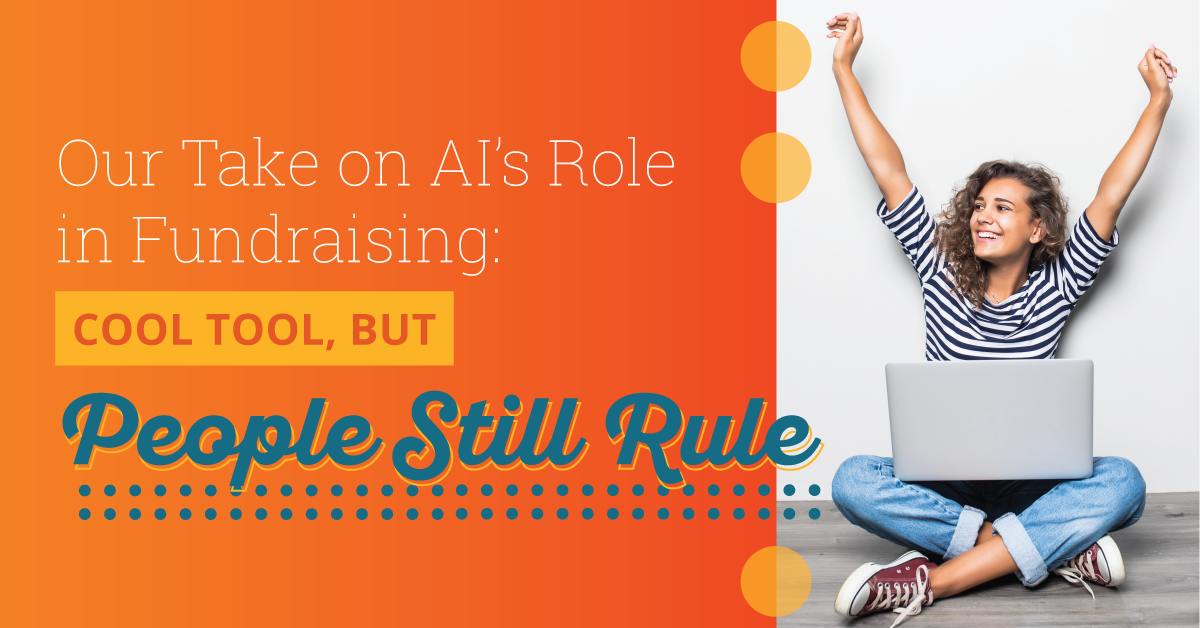
We are excited to kick off 2024 with a new voice on our blog! Kevin Cox, deputy editor, wordplay wizard, movie maniac and all-things-‘80s aficionado, is here to give you the lowdown on Stelter’s approach to AI in the work we do for our 1,300 nonprofit partners.
It’s the end of the world as we know it…and I feel fine. R.E.M. wasn’t talking about artificial intelligence in their hit 1987 song, but its dancing-past-the-graveyard spirit (not to mention the title itself) perfectly describes my feelings about AI.
Amid understandable angst about cheating students, fake reporters and robotic takeovers of humanity, The Stelter Company has devised its own catchy refrain regarding AI: “Cool tool, but people still rule.”
But First, Awe and Fear
As leader of content development at Stelter, I reacted like most people when AI became a real thing this year rather than a movie plot device—with a mixture of awe and fear. Would generative AI like ChatGPT, with the ability to spit out copy in seconds using just a few prompts, spell the end of writers? Will artists no longer be necessary if Dall•E 3 can conjure up images with breathtaking speed?
Then I took a deep breath, joined Stelter’s AI task force and got to work. After all, if our agency had incorporated new technology—fax machines, computerized design, online proofing, Zoom—over 60 years, surely it could handle AI. And if this tech could help inspire more donors to give transformational gifts, then it would be a disservice to our clients to reject it.
Research, Review, Application
So our task force read articles and whitepapers on AI. We followed news of both breathtaking advances and disheartening practices. We met often to discuss what it all meant.
Most importantly, we used AI tools—not just ChatGPT but Claude 2, Pi, Rosebud, Google Bard and Rytr, along with traditional apps newly infused with AI, such as Adobe Creative Suite and Zoom.
During our research, we noticed something: AI became a problem only when it was used as a substitute for the human touch. Left to their own devices, AI apps were prone to clichéd writing, results that looked “a little off” and conclusions that were flat wrong. Treated as an assistant, however, with careful oversight by actual people, they saved time and sparked ideas.
People First
Our experience led us to create a company statement on AI that mirrors our agency’s team charter, core values and marketing voice. If I had to summarize it in two words, I’d say this: People first.
Because people are the core of our business. People forge relationships with nonprofits. People feel deep connections with the missions of your organizations. People want to take care of their loved ones and loved causes in their estate plan.
No matter the tools we use, Stelter remains committed to engaging donors on the same emotional level with which those donors engage your nonprofit. This isn’t some woo-woo rationale—Stelter’s “secret sauce” is made with the finest ingredients: charitable giving research, survey data, the insights of Dr. Russell James, the tenets of philanthropic psychology and, especially, more than 800 years of combined fundraising experience among our staff.
Oh, the Possibilities
No doubt AI has caught the attention of the fundraising world. The possibilities of AI have been featured in many media outlets, webinars and industry conferences.
We believe the key is to use AI as an “artificial intern,” a trainable helper that can handle mundane or time-consuming tasks and give you more time to engage with donors. Try AI for transcription, documentation, thank-you notes, meeting summaries and idea generation.
Then partner with organizations like Stelter that are aided by technology but driven by people. Together, we can target donors more effectively and ultimately raise more money.
The world isn’t ending—it’s just changing. And we feel fine.
How are you using AI? What programs do you use? What do you find works well—and what is a waste of your time? We’d love to hear from you in the comment section below.
Also, if you missed Josh Birkholz’s closing keynote at CGP, “Empowered Gift Planners: Harnessing AI for Greater Impact,” (or even if you didn’t), you’re in luck! Josh has graciously agreed to present on the topic as part of our 2024 webinar series. We’ll have all the details and your chance to register on www.stelter.com/webinars in the coming weeks.

